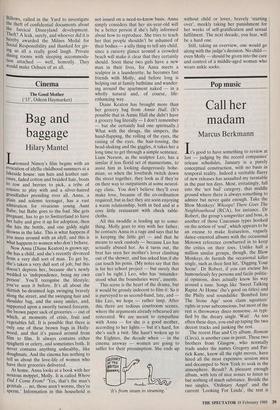Cinema
The Good Mother ('15', Odeon Haymarket)
Bag and baggage
Hilary Mantel
Leonard Nimoy's film begins with an evocation of idyllic childhood summers at a lakeside house: sun hats and leather suit- cases, faded cotton and braided hair, boats to row and berries to pick, a tribe of Cousins to play with and a silver-haired grandfather presiding over all. Anna, a Plain and solemn teenager, has a vast admiration for vivacious young Aunt Babe; but Babe goes to the bad. She gets Pregnant, has to go to Switzerland to have her baby and give it up for adoption; then she hits the bottle, and one giddy night drowns in the lake. This is what happens if You mess around with an idyll; and this is what happens to women who don't behave.
Now Anna (Diane Keaton) is grown up; she has a child, and she's recently divorced from a very dull sort of man. To get by, she's taken a very dull sort of job; but this doesn't depress her, because she's newly wedded to 'independence, being my own person'. You'll recognise the lifestyle; You've seen it before. It's all about the skittish be-denimed legs swinging bravely along the street, and the swinging hair and shoulder bag, and the sassy smiles, and, supported upon a sweetly turned forearm, the brown paper sack of groceries — out of which, at moments of crisis, fruit and vegetables fall. It is possible that there is only one of these brown bags in Holly- wood, and that it's passed around from film to film. It always contains either spaghetti or celery, and sometimes both. It never contains anything unhealthy, like doughnuts. And the cinema has nothing to tell us about the love-life of women who have their groceries delivered.
At home, Anna looks at a book with her noxious moppet, Molly. It is called Where Did I Come From? 'Yes, that's the man's genitals ... no, those aren't worms, they're sperm.' Information in this household is
not issued on a need-to-know basis. Anna simply considers that her six-year-old will be a better person if she's fully informed about how to reproduce. She tries to teach her that people shouldn't be ashamed of their bodies — a silly thing to tell any child, since a cursory glance around a crowded beach will make it clear that they certainly should. Soon these two girls have a new man in their lives, for Anna meets a sculptor in a launderette; he becomes fast friends with Molly, and before long is helping out at family bathtime and wander- ing around the apartment naked — in a wholly natural and, of course, life- enhancing way.
Diane Keaton has brought more than her grocery bag from Annie Hall. (It's possible that in Annie Hall she didn't have a grocery bag literally — I don't remember — but she certainly had one spiritually.) What with the shrugs, the simpers, the hand-flapping, the rolling of the eyes, the raising of the eyes, the hair-tossing, the head-shaking and the giggles, it takes her a long time to get through a simple sentence. Liam Neeson, as the sculptor Leo, has a similar if less florid set of mannerisms, to assist him in looking dangerously bohe- mian; so when the lovebirds twitch down the street together, they look as if they're on their way to outpatients at some neurol- ogy clinic. You don't believe they'll ever make love, because of the co-ordination required; but in fact they are soon enjoying a warm relationship, both in bed and at a cosy little restaurant with check table- cloths.
All this twaddle is leading up to some- thing. Molly goes to stay with her father; he contacts Anna in a rage and says that he is keeping the little girl — and that he means to seek custody — because Leo has sexually abused her. As it turns out, the brat has seen her mother's lover climbing out of the shower, and has asked him if she can touch his penis. (My notes say that this is for her school project — but surely that can't be right.) Leo, who has 'misunder- stood what the boundaries were', assents.
This scene is the heart of the drama, but it would be grossly indecent to film it. So it is purveyed to us second-hand, late, and like Leo, we hope — rather limp. After this there are tedious courtroom scenes, where the arguments already rehearsed are reiterated. We are meant to sympathise with Anna — for she is a good mother, according to her lights — but it's hard, for she's such a twit. She hasn't woken up to the Eighties, the decade when — in the cinema anyway — women are going to suffer for their presumption. She ends up 'It's from steam to steaming.' without child or lover, bravely 'starting over', meekly taking her punishment for her weeks of self-gratification and sexual fulfilment. The next decade, you fear, will be a hard one.
Still, taking an overview, one would go along with the judge's decision. No child even Molly — should be given into the care and control of a middle-aged woman who wears ankle socks.


















































 Previous page
Previous page